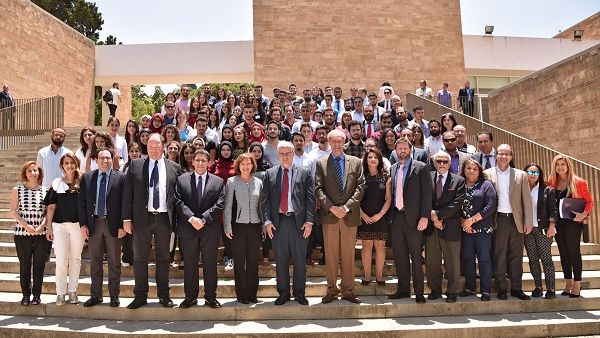AUB and USAID Celebrate the Graduation of 44 USP Scholars

the United States Agency for International Development (USAID) and the American University of Beirut (AUB) celebrated the graduation of 44 scholars from Lebanese public schools, who successfully completed the University Scholarship Program (USP).
Through USP, USAID supports public school graduates with full four-year scholarships including tuition fees, housing expenses, medical insurance, textbooks, and a monthly stipend. Equal numbers of male and female scholars are selected in a highly competitive environment, based on fairness and transparency as well as diversity, where all Lebanese districts are represented. Since the beginning of the program in 2010, 745 scholars have been granted scholarships that allowed them to study at AUB and the Lebanese American University.
The event was attended by US Ambassador Elizabeth Richard, USAID Acting Mission Director Bill Butterfield, AUB President Dr. Fadlo R. Khuri, Provost Dr. Mohamed Harajli, USAID and US embassy officials, graduates, and AUB faculty and staff, among others.
In the opening of the event, Director of USAID-USP at AUB Dr. Malek Tabbal welcomed the attendees and introduced a short video about the application and selection process that 300 students are currently going through which will result in the acceptance of 70 students to join AUB under the USP program next September.
In his remarks, AUB President Dr. Fadlo R. Khuri said: “These are times where societies are being constructed based on empowering the best and the brightest to go out and to create new opportunities and new, more open, and tolerant societies, and you’re a vital part of that effort. You are learning leadership, entrepreneurship, self-sufficiency, and you are learning tolerance, which is really from my perspective something that is on trial these days, the world over. This is a transformative leadership program that can only be transformative… if you fully immerse yourself and you engage in it. You are the beneficiaries of an investment by the United States government. USAID has long been an investment by the United States to inculcate American values and openness and a non-secterian openly secular approach to the world among people.”
Khuri continued: “This program really exemplifies the mission of AUB, which is to make a difference in the lives of the best and the brightest. It does not just benefit you; it actually benefits your community. If this is working well, you are going to go back into that community to make a difference. You’re going to create new opportunities, new knowledge, and yes, new excitement that, in fact, this country can succeed in the absence of a sustainable government structure so far.”
In her speech, US Ambassador Elizabeth Richard talked about the reason why the United States invests in education in Lebanon, saying: “The world is more interconnected than ever, our economies are inextricably linked and interdependent, and as we know unfortunately very very personally here in Lebanon, when there’s instability or war in any part of the world it affects each one of us. We believe that the stability, prosperity, tolerance, open-mindedness and enlightened thinking that you are learning and that you are practicing here in this country is going to be good for all of us. It’s going to be good for the greater Middle East region, and it’s going to be good for the entire world.”
Richard added: “I believe the real value of what you learned here is how to think critically, how to think for yourself, how to appreciate diversity, how to listen to others, how to learn from differences of opinion, and how the seemingly small investment of one person in the community can start to change the world.”
Finally, student speaker Omar Tantawi took the podium to speak about his experience studying at AUB under the USP program. Tantawi wrapped up his speech by saying: “AUB and USP scholarship took me all the way to be a successful leader. Without it, I would never have had the chance or the time to develop the sense of social responsibility and willingness to make change... I would never have had the chance to develop new skills… I would never have learned English and had the chance to participate in international workshops… I would never have had the chance to be a good implementer and a positive change maker in my community.”
After the ceremony, proud USP scholars shared their Community-Based Projects with a display of posters in the reception area of the AUB Hostler Auditorium. Ambassador Richard, President Khuri, and other audience members talked with the students and learned how they tackled various important issues in Lebanon—such as refugees and environmental concerns—with a creative and hands-on approach.
Background Information
American University of Beirut
Founded in 1866, the American University of Beirut is a teaching-centered research university based on the American liberal arts model of higher education. AUB has over 9,000 students and over 1,200 instructional faculty members. The University encourages freedom of thought and expression and seeks to graduate men and women committed to creative and critical thinking, lifelong learning, personal integrity, civic responsibility, and leadership.






